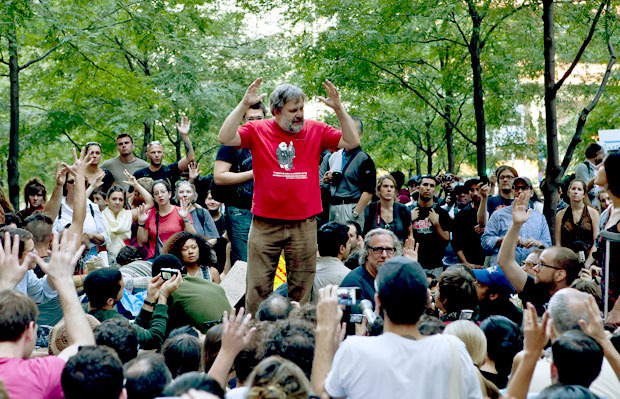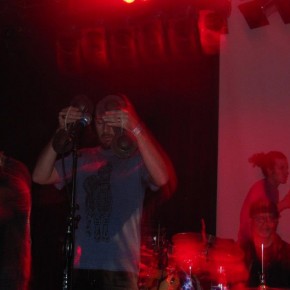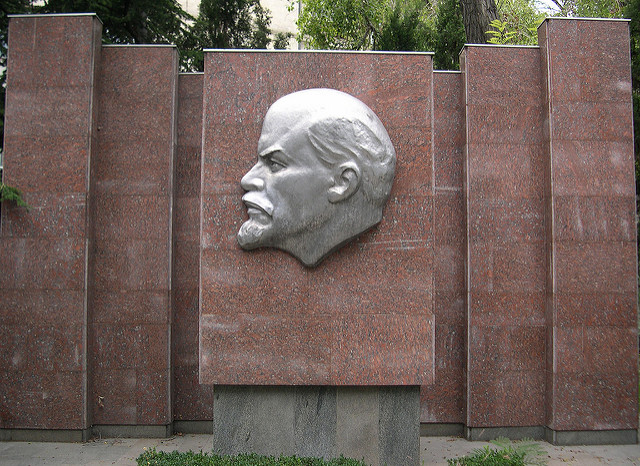When the peripatetic Slovenian philosopher Slavoj Zizek spoke to an appreciative audience at Occupy Wall Street on October 9th, it confirmed what many had already suspected: the protesters are surprisingly open to what graduate students used to call “theory, but with a capital T.” Although the usual anarchist and Marxist suspects are working hard behind the scenes, there is clearly a deep reservoir of patience for the meandering reflections of intellectuals who would rather pose questions than impose answers.
It’s not much of a stretch to regard the Occupy movement’s success as a direct result of its refusal to commit to a coherent ideology. Aside from participants’ foundational declaration that they belong to the 99% — about as safe an identity category as you’ll ever find — they have largely expressed themselves in the spirit of the song “Fortunate Son” by Creedence Clearwater Revival, telling interviewers what they are not instead of what they are:
Some folks are born silver spoon in hand
Lord, don’t they help themselves, oh
But when the taxman comes to the door
Lord, the house looks like a rummage sale, yes
It ain’t me, it ain’t me, I ain’t no millionaire’s son, no
There’s no doubt that this brand of populist ressentiment plays well in the United States no matter where a person falls on the political spectrum. The Tea Party mobilized it very effectively and so has the Occupy movement.
From an intellectual standpoint, it might be hard to see what this posturing has in common with the abstruse and often evasive arguments of thinkers like Jacques Derrida, Michel Foucault, Judith Butler and Zizek himself. One is a little bit country and the other a little bit avant-garde. But they actually have more in common than first meets the eye.
For one thing, they share a need to deactivate the classificatory mechanisms that would destroy their capacity for surprise. Once you are labeled as a member of a particular group, it becomes much harder to communicate your message effectively. The trick is to keep audiences guessing as long as possible, so that they actually have to do the work of figuring out where you stand.
In the case of Critical Theory, this has typically required the performance of a delicate balancing act, rejecting the orthodoxies of political parties on the Left without embracing their opponents. In postwar France, for example, the entrenchment of party-line Marxism in both the working classes and the educational system made it difficult for anyone who wanted to pursue new lines of inquiry. That’s why someone like Michel Foucault always seems to be going out of his way to declare that he isn’t your standard leftist, even though he spent much of his time deeply engaged with political causes embraced by the Left.
Americans faced a different, but related set of problems as Critical Theory started to gain a foothold in the 1970s. Because of the legacy of the Cold War, as well as the limitations imposed by the two-party system, the Left in the United States never achieved the sort of systemic power that it held in much of Western Europe. But that didn’t stop those who felt threatened by Critical Theory’s increasing popularity from classifying its defenders as radical socialists bent on destroying the American way of life. Responding to such hyperbolic allegations without simply accepting the designation required deft maneuvering. Pre-emptively stating the categories one rejected became a way of preserving intellectual freedom, though often at a steep price.
It’s the value of such maneuvering that the people involved in the Occupy movement seem to have grasped from the get-go. Whenever a new social movement breaks the surface, a massive effort is made to redirect its energy in the service of the status quo. Working together, even if they operate under the illusion that they are pitted against each other, representatives of the political establishment try to turn fear of the new into a rebranding of the old. And the mainstream media does its part, using the cover of neutrality to dismiss whatever cannot be readily assimilated by existing corporate and governmental structures.
As the invective hurled at President Obama demonstrates, political name-calling in the United States hasn’t progressed very much since the 1960s. The difference is that, whereas only the extreme right-wing fringe would have had the gumption to call a mainstream Democrat a “socialist” back then, these days even mainstream conservatives use the term without reservation even when — indeed, precisely when — it is completely baseless.
That’s why the amorphous Occupy movement, which encompasses everyone from disgruntled veterans to Baby Boomers reliving their hippie youth to graduate students who really do read Critical Theory for fun, has been characterized as the work of an America-hating vanguardist group. In the face of such relentless pressure to stake its ideological claim, the movement’s refusal to become something more specific than the 99% actually looks like a savvy bit of strategy.
In other words, the weaknesses of the Occupy movement can also be regarded as its greatest strength. By rejecting the parameters of mainstream politics, its participants have forced the country to take notice. That’s why it wasn’t surprising that, shortly after his appearance at Occupy Wall Street, Zizek appeared as a guest on the PBS show Charlie Rose, discussing topics rarely broached on the American airwaves. When the establishment is desperate to make sense of a phenomenon, it will even ask for the insight of people that it normally considers to be purveyors of nonsense.
NOTE: This is the first piece in the series Occupy Theory, which will reflect on the relationship between the protests and the intellectual traditions that have helped to shape them. Look for the next two installments, concerning Slavoj Zizek’s television appearance on Charlie Rose, and the French manifesto The Coming Insurrection
Photograph of Slavoj Zizek speaking at Occupy Wall Street by Kashish Das Shrestha








It appears Continental Philosophy reigns at OWS. This may have something to do with their perceived Anti-American cred.
Or at least their willingness to look beyond the American framework for inspiration.